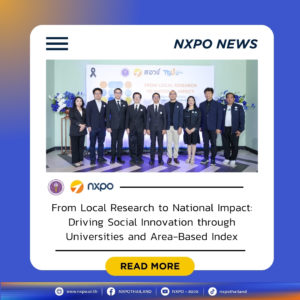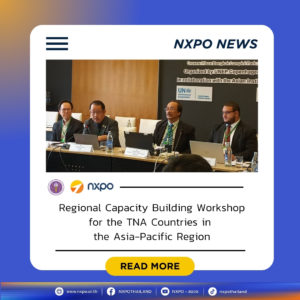NXPO took part in the 80th Session of the United Nations Economic and Social Commission for Asia and the Pacific (UNESCAP) held from 22 to 26 April 2024 at the United Nations Conference Centre in Bangkok. The event, themed “Leveraging digital innovation for sustainable development in Asia and the Pacific”, brought together government leaders, ministers, and ambassadors from 53 UN member countries in Asia and the Pacific, and representatives from various international organizations.

During the opening session, Mr. Srettha Thavisin, Prime Minister and Minister of Finance of Thailand, delivered an address, emphasizing the crucial role of digital innovation. He proposed two key approaches for its implementation. The first approach focuses on empowering people and communities through a people-centric digital transformation, guided by the Ignite Thailand vision to enhance community capabilities and drive sustainable growth. The second approach involves managing the risks associated with digital innovation, including addressing cyber threats and reducing digital inequality to ensure safe, secure, and equitable digital transformation.

Representing Thailand, NXPO Policy Specialist Mr. Parinand Varnasavang delivered a statement on the agenda on trade, investment, enterprise, and business innovation. He underscored Thailand’s commitment to accelerating sustainable and inclusive development through digital technology and innovation. Mr. Parinand highlighted the National Digital Trade Platform (NDTP) spearheaded by the Joint Standing Committee on Commerce, Industry and Banking (JSCCIB) and the Thai People Map and Analytics Platform (TPMAP) as key examples. TPMAP leverages big data and artificial intelligence (AI) to analyze integrated data from various sources, enabling government agencies to design solutions for poverty alleviation and capacity building for community enterprises and SMEs. This project is a collaboration between the Office of the National Economic and Social Development Council (NESDC) and the National Electronics and Computer Technology Center (NECTEC). TPMAP has also been included in the “AI for Social Good Initiative”, a collaborative project between the UNESCAP and partners to facilitate the development of country-specific AI governance frameworks and national capabilities. Additionally, Thailand’s Ministry of Higher Education, Science, Research and Innovation (MHESI) commended the efforts of the Asian and Pacific Centre for Transfer of Technology (APCTT) under UNESCAP in facilitating international technology transfer to bridge development gaps in the region and achieve sustainable development goals.

Mr. Parinand also participated in a panel discussion on “subregional perspectives on digital innovation for SDG acceleration”, moderated Mr. Baasanjav Ganbold, Head of East and North-East Asia Office at UNESCAP. Other panelist included Ms. Sarah Mecartney from Secretariat of the Pacific Community, Dr. Aladdin Rillo from Economic Research Institute for ASEAN and East Asia, and Ms. Patama Chantaruck from Accenture Thailand. During the discussion, Mr. Parinand explained how Thai higher education institutions leverage digital innovation to achieve sustainable development goals (SDGs). He stated that Thai universities are tasked to spearhead the implementation of digital innovation to drive sustainable development and transform into digital universities, as outlined in the 2021-2027 Higher Education Plan. MHESI, in collaboration with the Knowledge Network Institute of Thailand, has developed a Digital Maturity Model as a tool to assess universities’ readiness for digital transformation. Moreover, MHESI has partnered with the Equitable Education Fund (EEF) to utilize big data and AI to analyze data on underprivileged students and provide targeted aid. Mr. Parinand underscored the importance of stakeholder engagement and international collaboration in enhancing these efforts and highlighted the key roles of UNESCAP and subregional organizations like ASEAN in forging partnerships for sustainable development.







